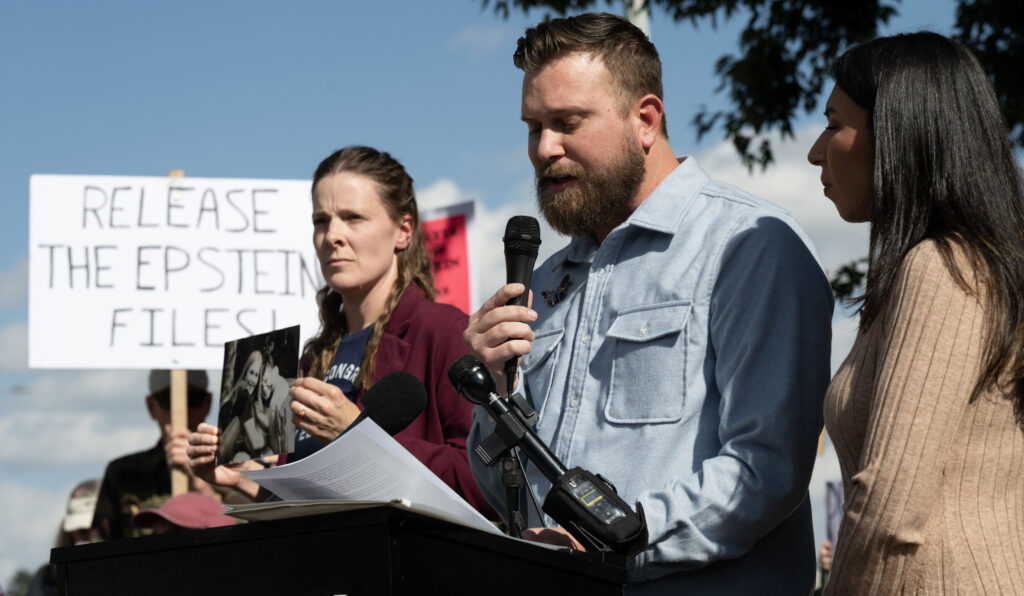Colorado Joint Budget Committee addresses wolf reintroduction concerns with budget footnotes
While agricultural organizations did not succeed in their efforts to halt the reintroduction of more wolves, they found a more sympathetic ear among policymakers at the state Capitol.
In their work on “footnotes,” which are directions to state departments on administering appropriations, the Joint Budget Committee adopted two items related to the wolf reintroduction program. Footnotes do not have the force of law, although state agencies comply. Even when the governor vetoes a footnote, usually due to a separation of powers issue, he often directs the agencies to comply anyway.
The first said the annual $2.1 million general fund appropriation should be used to implement Proposition 114, the narrowly-adopted 2020 ballot measure that resulted in the introduction of 20 wolves in Colorado. The wolves have been preying on livestock, frustrating livestock growers.
That standard footnote has been included in the budget bill for several years.
The second deals with the petition submitted last September by 22 agricultural groups and other parties, such as Colorado Counties, Inc. They asked Colorado Parks and Wildlife to hold off on any further releases of the apex predators until a fully-fledged wolf management program had been implemented.
“It is the General Assembly’s intent that the portion of these funds that are intended to be appropriated for the implementation of Proposition 114 not be spent on any future wolf reintroduction unless and until full and complete implementation of all state funded preventative measures discussed by the Parks and Wildlife Commission as part of its denial of a citizen petition to half wolf reintroduction during its January 8, 2025, meeting,” said the footnote approved by the Joint Budget Committee on March 17.
The budget panel is working on the 2025-26 budget and has bought itself an extra week by delaying the spending plan’s introduction until Monday, March 31. The state government faces a $1 billion deficit, and budget drafters have been scrambling to fill the fiscal hole.
The agricultural groups’ petition, which the CPW Commission denied on a 10-1 vote in January, sought seven items, including the following:
• Adopt a clear definition of “chronic depredation” and mandate lethal take requirements for wolves that consistently prey on livestock. The petition said Colorado Parks and Wildlife has “relied on the ambiguity of the term to deny any request to lethally control chronically depredating wolves in Jackson and Grand Counties.” Commission Chair Dallas May told the Senate Agriculture and Natural Resources Committee last week that had the definition been in place, the male of the Copper Creek pack, believed responsible for killing a dozen livestock, would have met the criteria for lethal management.
• Proactive development, testing and funding of “non-lethal” methods to prevent depredations and fully fund range riders dispatched in areas potentially affected by wolf introductions. “Range riders patrol on horseback and in vehicles to intercept and scare away wolves threatening livestock and working dogs. The petition emphasizes the need for a streamlined process that allows producers to easily enroll in these prevention programs,” the Colorado Cattlemen’s Association said in a statement last September.
• Conduct vulnerability site assessments on potentially impacted operations before future wolf releases. These assessments will allow Colorado Parks and Wildlife to understand each operation clearly, while ensuring that producers are informed about the full range of non-lethal options available, the petition said. “This collaborative approach will enable CPW and producers to agree on what methods are suitable for each specific operation and which ones may not be effective, promoting tailored solutions for livestock protection,” the cattlemen’s group said.
• Put in place a trained rapid response team, deployed to areas where wolves are actively preying on livestock to mitigate damage before it escalates.
• Collaborate with ranchers on carcass management.
• Develop a communication plan and consult with local officials, communities, and producers.
Some of those items have since been completed, such as the definition of chronic depredation.
The state wildlife agency has claimed that it has met requests, but sources said the alleged killing of cattle in Pitkin County last weekend and dogs and cattle in Jackson County earlier this month, all of which are now under investigation, is another indication that not everything is in place.
Responding to questions on the $2.1 million appropriation, JBC Chair Sen. Jeff Bridges, D-Greenwood Village, said these dollars could be diverted to higher-priority state needs, such as K-12, higher education, or child welfare.
While he acknowledged that some of that money could be used to bring in more wolves, he said most should be used to implement the items identified in the petition.
He also said he believes the governor, who has the authority to veto footnotes, will leave it alone, and that it will not be challenged when the budget bill moves through the legislature next month.
“We have an agreement (with the Department of Natural Resources] on the language,” he told Colorado Politics. “We expect the department will follow this.”
During the March 17 JBC meeting, Sen. Barbara Kirkmeyer, R-Brighton, asked what would happen if the governor vetoed the footnote.
“We run a bill,” replied Bridges, one that would make the program’s funding contingent on CPW meeting those requirements.
A third footnote requires CPW to provide a report on wolf depredations by Nov. 1, 2025. The agency released a report last September that included nothing on depredation problems. CPW claimed it left out that information because it was following a “biological” year from April 1 to March 31.
Colorado Parks and Wildlife's first report on wolf reintroduction does not include livestock killings
The first report of a wolf killing livestock in Grand County, from wolves relocated to Colorado from Oregon, happened on April 2, 2024. Ranchers believed CPW deliberately chose the April 1 to March 31 span to avoid discussing the depredations.
The JBC request requires the report to include information “since at least January 2024” based on the calendar year. The requested information would list all depredation incidents, claims and compensation paid, including the source of funds and direct and indirect costs.
The Department of Natural Resources, in a statement, said “Footnotes are not binding and the Executive Branch will not be constrained by any limitations or obligations implied by a footnote. CPW and DNR have already committed to implementing preventative measures outlined in the petition request.”
“CPW and DNR appreciate the Committee’s collaboration and support in maintaining the funding necessary to support those efforts. The agency’s efforts to put preventative measures in place will be ongoing and evolve, particularly as new technologies emerge.”
Sen. Dylan Roberts, D-Frisco, was part of the effort to put the footnote into the budget bill.
He told Colorado Politics he believes the footnote has gotten CPW’s attention and the agency is nervous about it. Roberts described the the version going into the budget bill as strong.
As approved by the JBC, the current footnote language was worked out with Kathleen Curry of the Gunnison Stockgrowers Association and John Swartout of the Colorado Outdoor Coalition, Bridges and Roberts.
Regarding the legality of footnotes, Roberts explained, “Plan A would have been to have the petition accepted by the commission, which would have made it legally binding.”
Although it isn’t legally binding, putting the footnote into the state budget gives it a certain weight once the governor signs off on the budget, he said.
Roberts said he also believes the governor’s office will not work to amend or strip the footnote.
As for the programs identified in the petition and the footnote, Roberts said he isn’t satisfied with the progress. He noted that some things have been completed and others haven’t.
“The real test of whether they are adequately funded and supported” will be this spring and summer during calving season, he said.
If depredations continue at an unacceptable level, he added, “we’ll know that (these programs) haven’t been put in place well; if there are moderate to low depredations, we’ll know things are working.”











